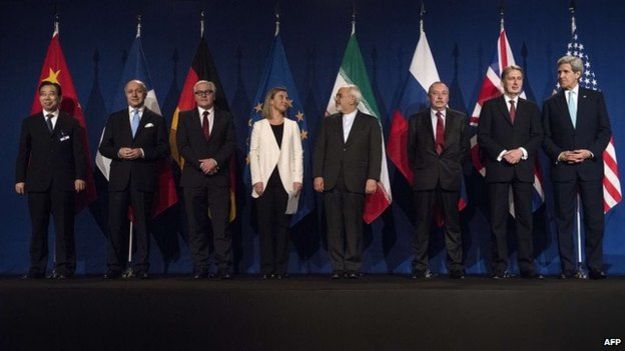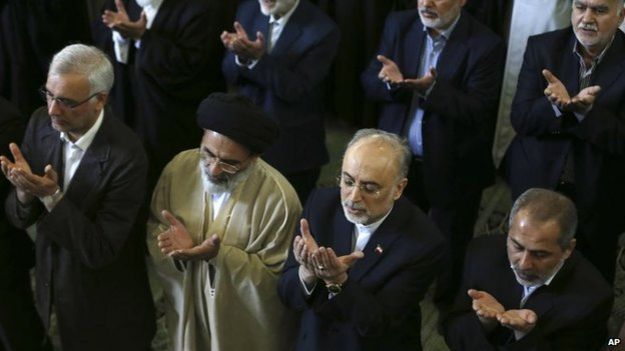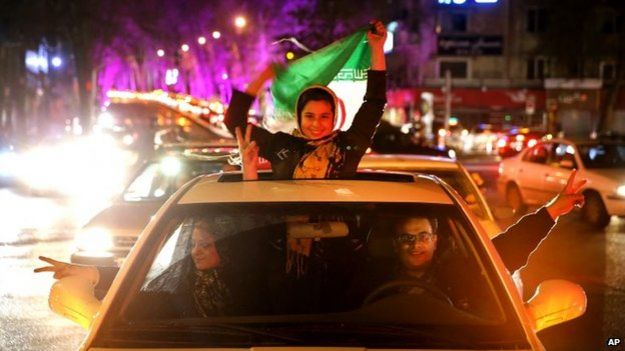Iran’s president has vowed it will abide by the terms of the preliminary nuclear agreement it signed with six world powers, so long as they do too.
“The world must know that we do not intend to cheat,” Hassan Rouhani said in a televised address to the nation.
But Mr Rouhani warned that Iran would have other options if world powers “one day decide to follow a different path”.
The framework deal signed on Thursday will see Iran curb nuclear activities in return for relief from sanctions.
Earlier Israeli Prime Minister Benjamin Netanyahu warned that it posed a grave danger to the region, in particular his own country.
He said any compressive accord, due before 30 June, had to include a “clear and unambiguous Iranian recognition of Israel’s right to exist”.
“Israel will not accept an agreement which allows a country that vows to annihilate us to develop nuclear weapons,” Mr Netanyahu asserted.
‘Third way’
President Rouhani reiterated that Iran’s nuclear programme was peaceful.

Mr Rouhani said the deal showed Iran “can have co-operation with the world”
The country was “not two-faced”, he said, and would honour any final deal provided the P5+1 – the US, UK, France, Russia, China and Germany – did the same.
“If the other side acts on its promises, Iran will abide by its promises. If, however, they one day decide to follow a different path, our nation too will be always free to make [another] choice.”
Mr Rouhani also stressed that the world now accepted Iran had the right to enrich uranium on its own soil, and that enrichment was not a threat to anyone.
Analysis: Lyse Doucet, BBC News, Lausanne
There’s been celebration through the night across Iran and a hero’s welcome for Foreign Minister Javad Zarif. But the deal he’s brought home has been dismissed by hardliners who say Iran surrendered too much in exchange for too little.
John Kerry also faces a mix of support and scepticism in the US Congress. The loudest condemnation has come from Israel’s Prime Minister Netanyahu, who insists this deal doesn’t block but helps Iran build a nuclear bomb.
As hard as it was to reach this preliminary agreement, it will be even harder to draft a final deal by the end of June. But, if negotiators do it, it will be a victory for diplomacy which, they believe will make the world a much safer place.
“Enrichment and all our nuclear technology is merely for the progress of Iran. This enrichment and technology is not against any regional country or the world,” he added.

Before Friday prayers, nuclear chief Ali Akbar Salehi (3rd left) said the future was “very bright”
Since 2006, the UN Security Council has adopted six resolutions demanding Iran stop the activity because, while enriched uranium is used as fuel for nuclear reactors and for medical and agricultural purposes, it can also be used to make nuclear bombs.
“Today is a day that will remain in the historic memory of the Iranian nation,” Mr Rouhani said.
“Some think that we must either fight the world or surrender to world powers. We say it is neither of those, there is a third way. We can have co-operation with the world.”
‘Safer world’
After the deal was announced on Thursday night, many Iranians took to the streets of Tehran to celebrate and posted messages of support on social media.

People took to the streets of the Iranian capital after the deal emerged late on Thursday
But hardliners close to Supreme Leader Ayatollah Ali Khamenei criticised the negotiation team, led by Foreign Minister Mohammed Javad Zarif.
“To sum up the deal framework in one sentence – we handed over a saddled horse and received a broken bridle in return,” Hossein Shariatmadari, one of Ayatollah Khamenei’s advisers and editor of the influential hardline newspaper Kayhan, told the Fars news agency.
US President Barack Obama said the framework agreement would make the world a safer place, as it would “cut off every pathway that Iran could take to develop a nuclear weapon”.
BBC
 Q FM Africa's Modern Radio
Q FM Africa's Modern Radio